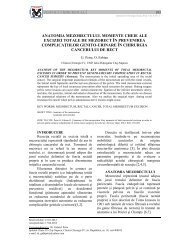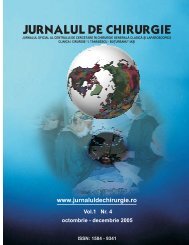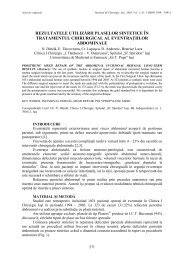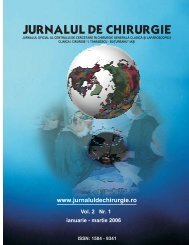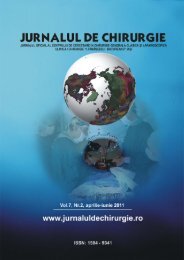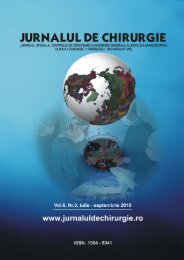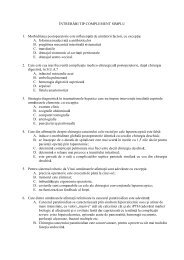PDF (10 MB) - Jurnalul de Chirurgie
PDF (10 MB) - Jurnalul de Chirurgie
PDF (10 MB) - Jurnalul de Chirurgie
Create successful ePaper yourself
Turn your PDF publications into a flip-book with our unique Google optimized e-Paper software.
Articole originale <strong>Jurnalul</strong> <strong>de</strong> <strong>Chirurgie</strong>, Iaşi, 2011, Vol. 7, Nr. 3 [ISSN 1584 – 9341]<br />
RECURENŢA LOCALĂ DUPĂ EXICIZIA TOTALĂ DE<br />
MEZORECT – O PROBLEMĂ DE ACTUALITATE<br />
Lili-Gabriela Lozneanu, G. Dimofte, Simona Nicolescu, V. Boboc, E. Tarcoveanu<br />
Clinica I <strong>Chirurgie</strong> „I. Tănăsescu – Vl. Buţureanu”<br />
Universitatea <strong>de</strong> Medicină şi Farmacie ”Gr.T.Popa “Iasi<br />
LOCAL RECURRENCE AFTER TOTAL MESORECTAL EXCISION - A CURRENT ISSUES<br />
(ABSTRACT): Background: Despite the major improvements that have been ma<strong>de</strong> in both surgical<br />
technique and adjuvant radio(chemo)-therapy, local recurrence still remains a challenge and is difficult to<br />
treat. The introduction of total mesorectal excision (TME) has increased the patient’s outcome. Methods:<br />
By investigating a prospective rectal cancer trial (23 consecutive patients, from one single surgeon which<br />
has un<strong>de</strong>rgone training in TME) over a period of 7 years the factors responsible for the poor outcome<br />
were <strong>de</strong>termined and the causes leading to local recurrence were assessed. Results: 23 patients had<br />
un<strong>de</strong>rgone potential curative anterior resections with TME and stoma diversion, followed by mechanical<br />
anastomoses using stapling <strong>de</strong>vices. All patients were diagnosed with rectal a<strong>de</strong>nocarcinoma, with a<br />
median level of 8 cm from the anal verge. There were 3 local recurrences (13.04%), in one case being<br />
associated with distant recurrence. The median follow-up period was 30 months. The analysis of recurrent<br />
cases revealed a lot of imputable errors in the learning period. Conclusions: Lowering pelvic recurrences<br />
is possible by the continue improvement of dissection technique by training. There is a learning curve,<br />
and the results are very different after the achievement of optimal dissection technique.<br />
KEY WORDS: RECTAL CANCER, TOTAL MESORECTAL EXCISION, LOCAL RECURRENCE,<br />
LEARNING CURVE.<br />
Corespon<strong>de</strong>nţă: Dr. Lili-Gabriela Lozneanu, medic primar chirurgie generală, doctorand Universitatea <strong>de</strong><br />
Medicină şi Farmacie ”Gr.T.Popa “Iasi, Clinica I <strong>Chirurgie</strong>, Sp. Sf. Spiridon, str. In<strong>de</strong>pen<strong>de</strong>nţei, nr. 1,<br />
700111, e-mail: lili_lozneanu@yahoo.com * .<br />
INTRODUCERE<br />
Tratamentul cancerului rectal s-a îmbunătăţit semnificativ <strong>de</strong>-a lungul anilor,<br />
obiectivul primordial şi constant fiind o mai bună calitate a vietii (QOL), prin coborarea<br />
limitelor <strong>de</strong> rezecţie şi conservarea aparatului sfincterian, în condiţii <strong>de</strong> securitate<br />
oncologică. Cu toate acestea, recurenţa locală (LR) rămâne o problemă majoră şi cu un<br />
prognostic rezervat în tratamentul cancerului rectal, fiind rareori curabilă, iar<br />
simptomatologia, dificil <strong>de</strong> paliat.<br />
Ea este <strong>de</strong>finită ca recurenţa în patul tumoral, ganglionii regionali, structurile<br />
adiacente, anastomoza, pelvisul, perineul şi cicatricile postoperatorii. Inci<strong>de</strong>nţa raportată<br />
a acesteia după rezecţia potenţial curativă variază larg în literatura <strong>de</strong> specialitate intre<br />
5% şi 45% [1-4]. Această variaţie consi<strong>de</strong>rabilă în serii diferite este <strong>de</strong>terminată<br />
probabil <strong>de</strong> calitatea diferită a actului chirurgical, rate mai mari ale inci<strong>de</strong>nţei LR fiind<br />
asociate cu proce<strong>de</strong>ele chirurgicale convenţionale <strong>de</strong> excizie a rectului, prin ”blunt<br />
digital dissection”, nestandardizate.<br />
* received date: 07.06.2011<br />
accepted date: 29.07.2011<br />
359



